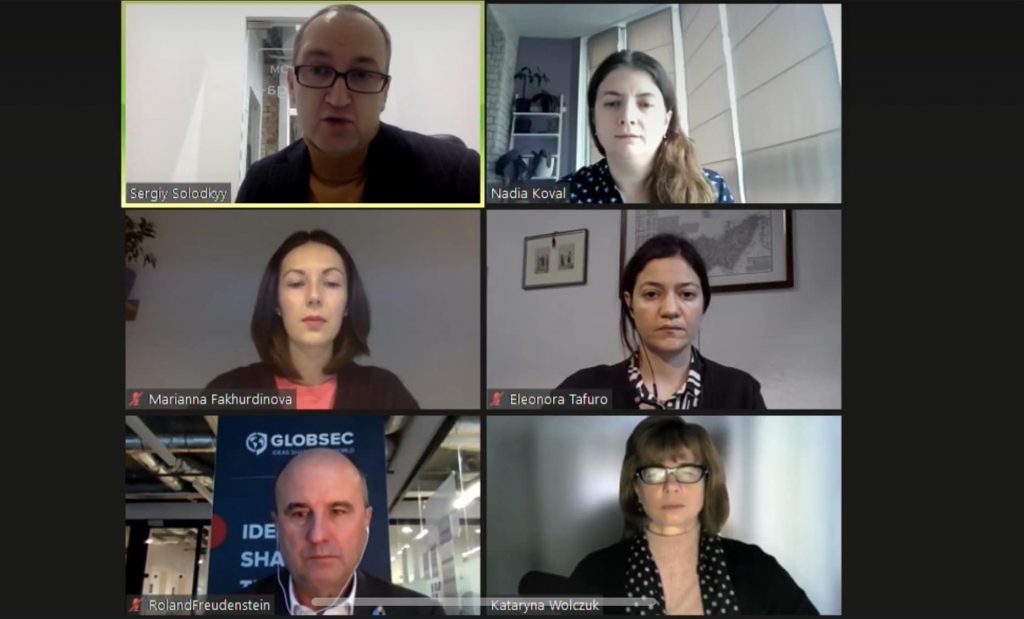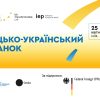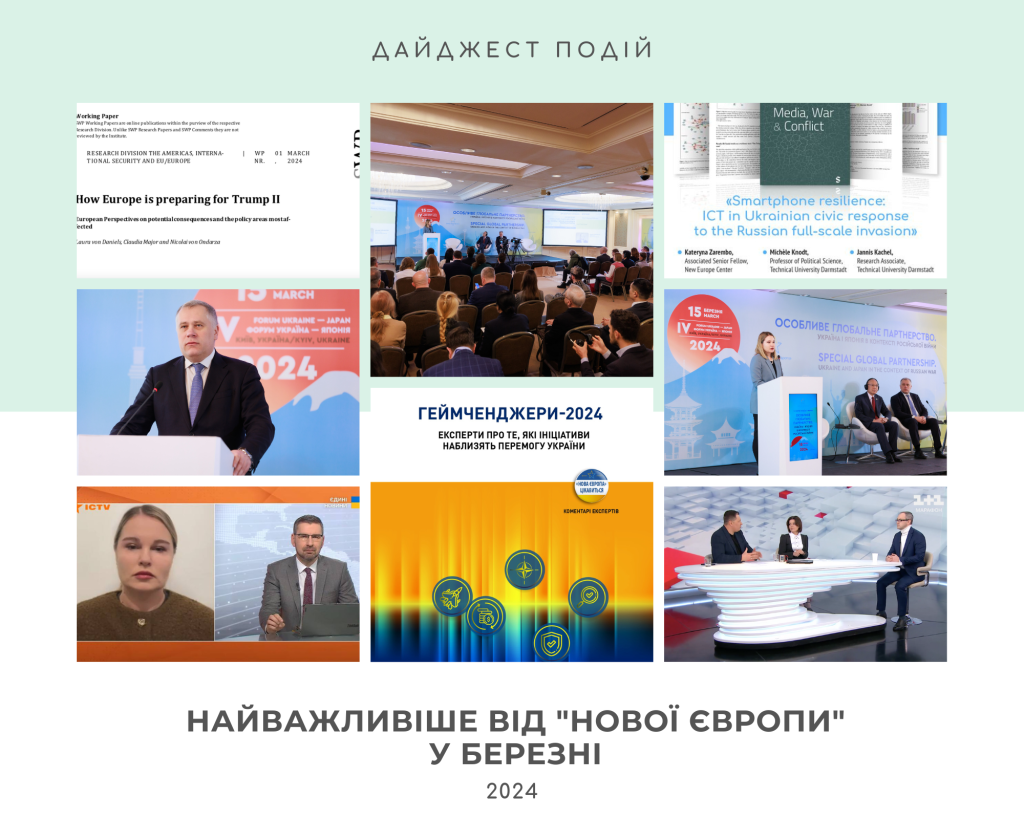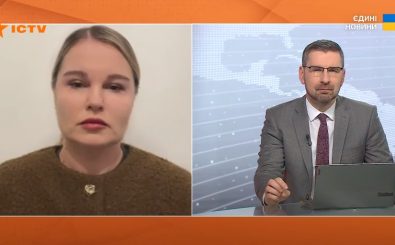Russia’s full-scale invasion of Ukraine has united Europe tremendously. However, after eight months of war, calls are beginning to be heard in European societies, which may lead to a decrease in support for Ukraine. How can Ukraine retain the support of the Europeans? These questions were discussed by the participants of the public discussion of the New Europe Center “Winter is coming: how to maintain the support of European societies for Ukraine?”, which took place on November 18.
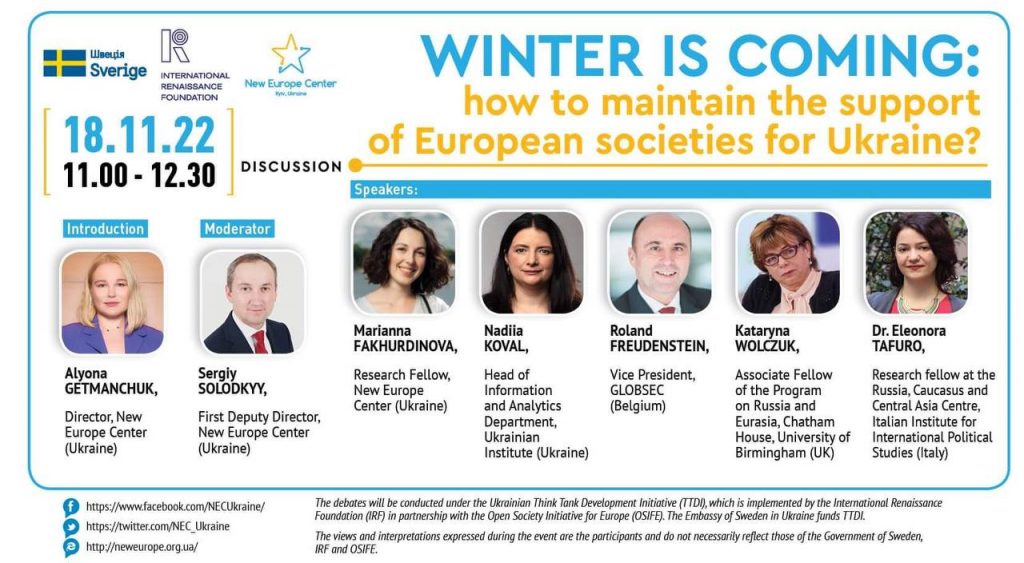
During the discussion, the relevant analysis, prepared by the New Europe Center, was presented. It analyzed the concerns and attitudes of citizens, and the opinions of experts from EU member states, as well as topics that were mostly covered by the European media with regard to Ukraine.
“The issues of the most concern for Europeans are rising prices and energy supply. Among the challenges are decreasing attention to the war, weakening of the sense of threat among the Europeans themselves, and sometimes a misunderstanding of the importance of aid, a low level of expertise regarding Ukraine, etc.,” said Marianna Fakhurdinova, Research Fellow of the New Europe Center.
Based on these results, the NEC developed a number of recommendations:
- What messages should be sent to Europeans? It is worth emphasizing what the real goals of Russia’s war are, explaining that economic difficulties are a consequence of Russia’s aggression and that reducing dependence is in the interests of Europeans. These messages should be not only about Russia and the war but also about Ukraine. For this purpose, we recommend that the stories of people who survived captivity and occupation and who can share their experiences be reported through the European media and various expert platforms. Communication should be positive: in the war with Russia, we are fighting for strengthening the rule of law, against corruption, etc.
- Communication should be targeted. With some countries, we can talk about the supply of weapons, while with others about reconstruction, humanitarian aid. Ukrainian stakeholders should not forget to thank foreign counterparts for the support. For example, placing words of thanks on billboards. Ukraine has to direct its communication efforts in a targeted manner at the local level. The Ukrainian side should consider the formats of communication with trade union leaders in EU countries.
- Who exactly should be involved — all stakeholders. It should be not only the government, the parliament, but also a wider circle of civil society organizations, ordinary Ukrainians who can join the promotion of Ukraine abroad. We are also talking about European intellectuals, analysts, politicians, journalists, whom Europeans will listen to.
Below are the key messages of the speakers from the public discussion:
Nadia Koval, Head of Information and Analytics at Ukrainian Institute
There should be an understanding that the war is for a long time. Therefore, there are short-term challenges – to survive the winter. And long-term: there are gaps with expertise about Ukraine in other countries. In order to maintain support, representatives of European societies should perceive us as those who share a common future, common security interests.
European countries must understand that we have a common challenge. We should fight for a certain global understanding of Ukraine in countries that are more favorable to Russian narratives, including in the countries of the Global South. There is an impact on the countries where Russia sells its weapons, supplied vaccines during COVID-19, where its channels are broadcast.
It is worth saying that defense against Russia means ensuring the security of the EU itself, that sanctions are harmful in the short term, but in the future they will free us from energy dependence.
Europeans have to understand that opposing Russia is right, morally. People tend to support not only winners, but also those who do the right things.
Roland Freudenstein, Vice President, GLOBSEC (Belgium)
In the media, public debates, on social media the attention for the war is very high. The changes since the 30th of September is a remarkable string of military successes for Ukraine. This has made a deep impression upon European societies. It has had a largely positive effect in the sense that military assistance to Ukraine, financial help, and political support in the perspective of EU membership has made sense.
Ukraine’s military successes have resulted in more people believing that it makes sense to support Ukraine. Those people who were skeptical about for example military assistance for Ukraine use Ukraine’s military success as saying so you see they don’t need us. It becomes for Ukraine supporters extremely important to emphasize how necessary help is.
When there were explosions in eastern Poland near the Ukrainian border, after a couple of hours you had a very authoritative statement from the US president and the next day from the Polish president that these were most likely Ukrainian operated air defense systems. And that in itself was not detrimental to our efforts to increase and maintain support for Ukraine because this would not happen if it hadn’t been for Russia’s attack on Ukraine. So Russia is to blame.
Dr. Eleonora Tafuro, Research Fellow at the Russia, Caucasus and Central Asia Centre, Italian Institute for International Political Studies (Italy)
Italy changed its government and the big fear coming with the victory of the right-wing coalition is that the support for Ukraine would diminish. This has not happened yet.
There are a couple of reasons for concern:
First is the price of utilities and inflation, which are a big concern. The main political mantra of the government is that they want to defend the Italian interest, the interests of the voters. So if the frustration of the voters increases then it’s possible that we can see some variations in the support for Ukraine.
Second, Meloni has a very embarrassing story of being close to Vladimir Putin. I’m talking about Silvio Berlusconi and Matteo Salvini. Even if they can’t openly support Putin because the public combination will be too high they can still spoil the process by for instance criticizing sanctions.
The pacifist movement in Italy did have a big demonstration for peace and that, of course, was criticized by many as being naive or even pro-Putin. The problem is that there seems to be a lack of relationship and understanding between the peaceful pacifist movement in Italy and the Ukrainian expertise.
The verdict on the downed MH-17 flight is an important decision. This is a dramatic incident that should have provoked that much reaction from the West countries.We need to invest in more awareness raising about this incident to make people know more about the dynamics beyond this terrible attack and how this leans Russia to the conflict in Ukraine from its very beginning not from February 2022.
Kataryna Wolczuk, Associate Fellow of the Program on Russia and Eurasia, Chatham House (UK)
The political class is largely on the Ukrainian side and whatever critique we have of Boris Johnson his modeling on Churchill has really been basically like a template for all prime ministers we`ve had and the three prime ministers they stay firmly.
Ukraine fuels the pre-existing narratives and also historical memories. In the UK, it’s the Second World War, and being on the right side of history doing what was right. However difficult it was, standing up to evil, this template is really receptive for Ukraine.
The BBC and other media outlets have been doing a stellar job in terms of actually covering Ukraine. They’re linking it to people on the ground. The British media is so important because it amplifies the messages about Ukraine.
I have three final points about what is really important for Ukraine:
- Cultural diplomacy. I would like to emphasize the importance of Banksy and his murals in Ukraine. You need to invite more artists, targeting them to come to Ukraine. I think it would be great if we could have more Ukrainian film screenings.
- Expressing gratitude. Showing the effectiveness of what difference it makes and that it saves lives. That’s important especially in countries with difficult histories like Italy and Germany.
- Targeting narratives. Every country is different. From my point of view just an idea – showing the destruction of Orthodox churches and emphasizing that Ukraine is a predominantly an Orthodox country. So showing this familiarity and showing solidarity through the linkages which shows the commonality seems to me the best way forward.
The public discussion was conducted under the Ukrainian Think Tank Development Initiative (TTDI), which is implemented by the International Renaissance Foundation (IRF) in partnership with the Open Society Initiative for Europe (OSIFE). The Embassy of Sweden in Ukraine funds TTDI.
The views and interpretations expressed during the event are the participants and do not necessarily reflect those of the Government of Sweden, IRF and OSIFE.



